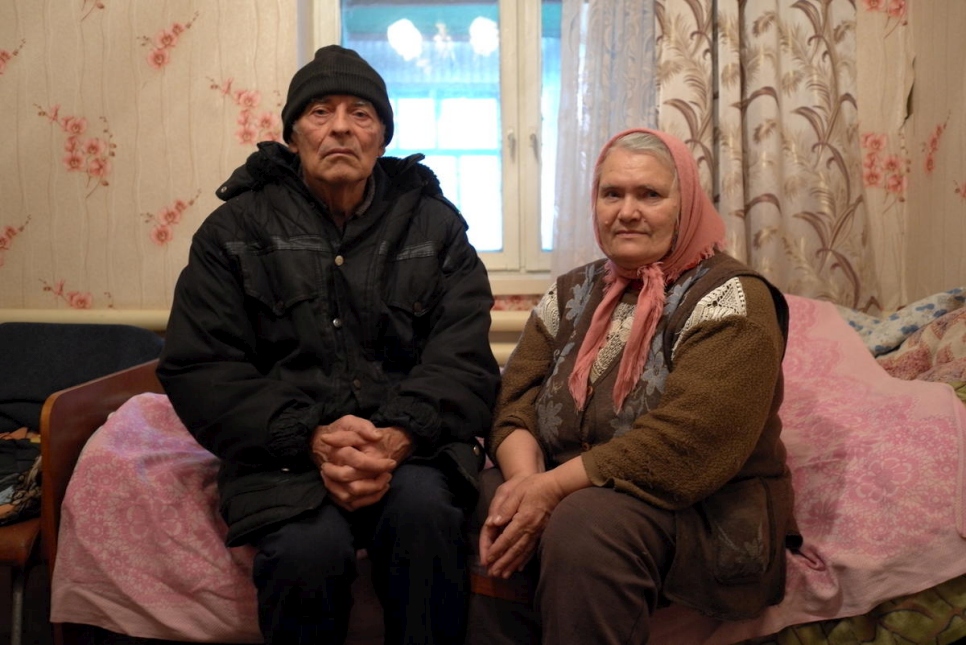Ukraine conflict hits home for elderly couple
Sergei and his wife were forced to dismantle a shell that hit their home, amidst a conflict that has internally displaced over 1.5 million people.
It was a surprisingly quiet day in August 2014 when 85-year-old Sergei* and his wife Nataliya received an unexpected visitor into their home – a six-metre-long rocket.
The elderly couple were no strangers to shelling. Since March that year, their village of Peremozhne in eastern Ukraine had been situated close to the frontline and most villagers had fled. Sergei and Nataliya realized their once prosperous and quiet paradise had become the centre of a battlefield.
During the bombing, the couple sheltered in a basement normally used to protect food and vegetables from the cold Ukrainian winter. It became their home during the most difficult times of the conflict around August 2014 when many houses of neighbours and friends were destroyed.
However, one afternoon, the shelling suddenly stopped. Noticing a change, Sergei came out of their improvised bunker.
“It was the strangest day, very beautiful blue sky and quiet, like a blessing, until it happened,” he recalls.
“It was the strangest day."
Suddenly, out of the clear blue sky, came a long metallic object. It flew through the roof of the house that Sergei had built over 40 years ago, “Without knocking!” he jokes.
It was in fact a six-metre long “Smerch” Rocket that smashed through the first floor and buried itself one metre into the ground. As it crashed into his home, only one of the four explosives detonated with a loud bang that shook the house’s foundation and covered his home with dust.
“The first thing I did,” says Sergei, “was to greet my visitor and tell it that it was not exactly the kind of humanitarian aid I was expecting on that day.”
He then approached a demining team in the hope they could remove the bomb from his home. However, when two specialists came to visit him, they told him that the only option would be to blow up the bomb – and, with it, his house.

Sergei points to where the missile hit his home to a UNHCR Luhansk staff. © UNHCR/Hugo Reichenberger
After Sergei insisted that he wanted to keep his house, the specialists joked and told him that the only option would be to take the bomb apart piece by piece, an impossible task that would put his and others’ life at risk. “As I heard this, I told them: ‘Thanks for the great advice, guys! And you better leave quickly because I will start today!’”
That same day, the old man began dismantling the bomb piece by piece, bolt by bolt, wire by wire, while his wife hid in the basement. Neighbours sometimes urged him to stop, but he was determined. “This house is all I and my wife have left in our lives,” he told them. “If we leave, our lives end. I will keep digging and dismantling.”
Eventually, Sergei became a myth among villagers, as many thought him dead after hearing loud bangs from other explosives. However, after 19 days, the bomb was completely dismantled and specialists were finally able to detonate the explosive part far from Sergei home.
"This house is all I and my wife have left in our lives."
Although relieved their ordeal is over, Sergei and Nataliya still face huge challenges in their everyday lives. Like millions of others, they must queue for hours at checkpoints and cross a dangerous bridge by foot in order to visit family, friends and medical facilities. Their pensions amount to just US$ 30 a month, but many others receive nothing at all.
Currently, people living in non-government controlled areas are required to register as internally displaced with the Ukrainian authorities in order to continue accessing their rightful pension benefits – despite pensions being an acquired right of all citizens. Every two months, thousands of elderly people, including those with disabilities and in wheelchairs, must undertake the perilous and expensive journey across the contact line to keep their registration active. Crossing in winter is particularly difficult, exposing people to freezing temperatures and long waiting hours, as well as shelling.
UNHCR, the UN Refugee Agency, is providing Sergei and his wife with shelter materials to fix their roof, thanks to donors. They have also received basic household and hygiene kits, in addition to regular visits from the agency.
However, with no solution to the conflict in sight, their difficulties are likely to continue in the coming months or years.
As conflict continues, Ukraine is fast becoming one of the world’s most mine contaminated countries and civilians are increasingly paying the price.
But Sergei knows better than most how to keep the faith.
“My secret that kept me going was gratitude,” he says. “Gratitude for the life, that I once had. Gratitude for the peace that I will one day find.”
*Names have been changed for protection reasons

